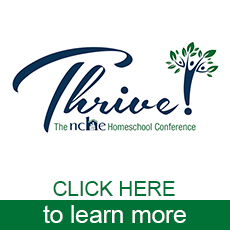 What’s the point of a great education if your children can’t seem to remember most of it?
What’s the point of a great education if your children can’t seem to remember most of it?
Tell me I’m not the only one.
You spend hours crafting the Ultimate Book List.
You incorporate hands-on-projects.
You basically make learning awesome and fun.
And a few years (or maybe even months or – worse – weeks) later, your children don’t seem to remember any of it.
It’s tempting to get a little grumpy about the perceived waste of time and effort.
I’ve been thinking about this phenomenon a lot recently while planning book lists and setting course goals for my high school students.
I am a second-generation North Carolina homeschooler, and I think this perspective gives me unique insight. You see, my parents gave me an amazing education. It was rich in language and great books and original sources and philosophy and discussion and hands-on practicality and fun and adventures… and did I mention the hundreds of books? But there are so many details I can’t remember (what exactly was Adam Smith’s main point in Wealth of Nations? and which constitutional amendment says what?)!
So was all that education a waste if I can’t remember the details? Was all that reading a waste if I can’t even remember all the main points, let alone the details? If education is merely the accumulation of knowledge, does my forgetfulness over the course of decades mean my education has failed?
What is the point of providing a true, good, and beautiful education if our children may not even be able to remember most of it?
You could ask a similar question about sermons. How many of us can remember details (or even the key points) of sermons from 6 months or 5 years ago? Does it then follow that they are a waste of our time? No! For the grace of God is at work transforming our hearts through those simple words each week. We may not be able to list out or measure what we’ve heard in the past, but we see the results in who we are today.
Thus it is with the education we receive and give.
These days, I may not be able to debate with you the finer points of Augustine’s City of God, Aristotle’s On Rhetoric, or Schaeffer’s The God Who is There, but those works and others were part of the incredible process God graciously used to form the human I am today.
I don’t know now (and certainly didn’t fully recognize even in the past) each stroke of the chisel, each swipe of the sandpaper over my character. But those millions of words shaped and nourished the way I think and what I love. The experience of being challenged by the things I learned gave me a passion for continuing to learn and question and grow that remains today.
This gives me great hope and renewed enthusiasm as I direct my own children’s education. My goal is not for them to indefinitely remember lists of facts. It’s not for them to pass reading comprehension tests. I don’t have to despair if my kids don’t remember the cool projects we did during history lessons 5 years ago.
We can trust the process. We can trust that God is at work. We can trust that the “little drops of water, little grains of sand” are forming our children. They’re learning not what to think, but how to think.
Education is repentance. Education, pursued well, leads to humility and doxology. Education must not ever be reduced to merely filling our minds with information.
So, let’s keep crafting epic book lists for our family read-alouds and read-alones. Let’s keep having deep conversations in addition to random discussions about the little things that make up daily life. Let’s keep reading the Bible and memorizing beautiful words and worshiping God and praying alongside our families.
And we can stand still and watch the beautiful work God continues to do in all of us, for His glory and our good.
Amy Sloan is a second-generation homeschooler by grace alone to five children ages 5 to 15. The Sloan family adventures in Holly Springs, NC. Follow @HumilityandDoxology on Instagram, Facebook, YouTube, and at HumilityandDoxology.com




